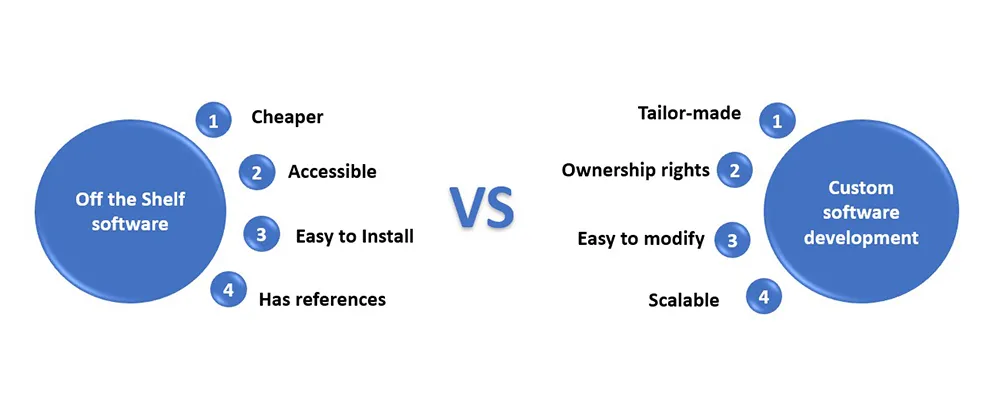Custom Software vs. Off-the-Shelf Solutions: Which is Right for Your Business?

Selecting the appropriate software for your company is a crucial choice that will have a big impact on operations, growth, and productivity. Two main options are available: custom software and off-the-shelf solutions. Each has benefits and downsides, so the ideal option will rely on your unique requirements and situation. Let’s explore the differences and help you determine which is right for your business.
Understanding Off-the-Shelf Solutions
Pre-built software meant to satisfy the requirements of a broad spectrum of customers is known as off-the-shelf software. Examples include Microsoft Office, QuickBooks, and Salesforce. These solutions are ready to use right out of the box and typically come with a lower upfront cost compared to custom software.
One of the main benefits of off-the-shelf software is its cost-effectiveness. Because the development costs are spread across many users, the price per user is relatively low. Additionally, these solutions are usually well-documented and supported, making them easy to implement and use.
Another advantage is the speed of deployment. Off-the-shelf software can be installed and operational within a short period, which is ideal for businesses that need a quick solution. Regular updates from the vendor ensure that the software stays current with the latest features and security patches.
However, off-the-shelf solutions have their limitations. Since they are designed for a broad audience, they may not perfectly align with your specific business needs. You might find yourself paying for features you don’t need while lacking essential ones. Customization options are often limited, which can be a significant drawback for businesses with unique requirements.
The Case for Custom Software
Custom software is developed specifically for your business. It’s tailored to fit your processes, workflows, and goals precisely. This personalized approach ensures that the software meets all your needs without any unnecessary features.
One of the most significant advantages of custom software is its flexibility. Your software can be extended and modified to meet changing needs as your firm expands and changes. This scalability ensures long-term relevance and usability, providing a solid return on investment.
Custom software also offers a competitive edge. Unique features and capabilities tailored to your business processes can enhance efficiency, productivity, and customer satisfaction. This differentiation can be crucial in competitive markets, where having a tailored solution can set you apart from competitors.
However, the benefits of custom software come with higher costs and longer development times. Creating a custom solution involves a substantial upfront investment and ongoing maintenance costs. The development process can take months, depending on the complexity of the project. This time commitment may not be feasible for businesses that need a solution immediately.
Additionally, custom software requires a close working relationship with your development team. Clear communication is essential to ensure that the final product meets your expectations and needs. This collaboration can be time-consuming but is crucial for the success of the project.
Making the Decision
Keep the following things in mind while choosing between off-the-shelf products and custom software.
- Budget
Evaluate your budget to determine if you can afford the higher initial investment required for custom software. While off-the-shelf solutions have a lower upfront cost, custom software can offer better long-term value if it significantly enhances your operations.
- Timeline
Consider how quickly you need the software in place. If you need an immediate solution, off-the-shelf software might be the better choice. Custom software development takes time, and if your need is urgent, the delay might not be acceptable.
- Specific Needs
Assess how specific your requirements are. If your business has unique processes that off-the-shelf solutions cannot accommodate, custom software will likely be more beneficial. On the other hand, if your needs are relatively standard, an off-the-shelf solution may suffice.
- Scalability and Flexibility
Think about your long-term goals and how the software will support them. Custom software offers scalability and flexibility to grow with your business, while off-the-shelf solutions might need to be upgraded or replaced as your business evolves.
- Competitive Advantage
Consider whether having a unique, tailored solution would provide a significant competitive edge in your industry. Custom software can enhance your capabilities in ways that off-the-shelf solutions cannot.
At CloudBiz Solutions, we specialize in helping businesses navigate these decisions. Our team can work with you to assess your needs, budget, and goals, ensuring you choose the software solution that best fits your business. Whether you opt for a custom solution or an off-the-shelf product, we’re here to ensure you get the most value and effectiveness from your software investment.

